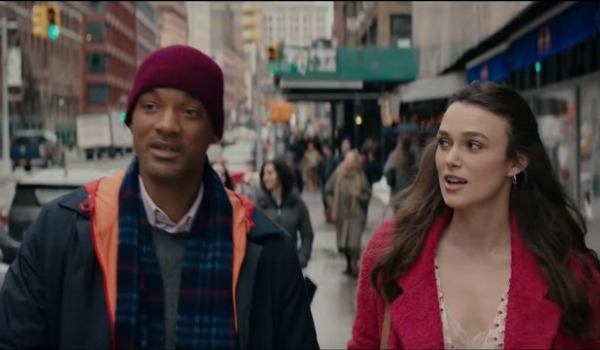Collateral Beauty is the Everybody Hurts of the 2016 movie calendar. There's cancer, death, child death, child cancer, divorce, an affair, loneliness, and probably even more that I've mentally blocked out to contend with, all of which audiences should be deeply affected by because of the cavalcade of acting talent Collateral Beauty has at its disposal. But you just don't. For the most part, at least. Admittedly, you'll get choked up at specific points in Collateral Beauty, but it overextends itself trying to placate to all of its plots and sub-plots and never comes close to being a real Christmas cracker.
Collateral Beauty opens on Will Smith's Howard Inlet, a hugely successful advertising executive whose company is on the rise. But the death of his daughter sends Howard spiraling into an understandable depression. The company suffers as a result, as Howard spends less and less time with his clients. Grief-stricken, Howard even sends letters to Love, Time, and Death in his pursuit for happiness.
Out of ideas and close to bankruptcy, the company's three other executives Whit Yardsham (Edward Norton), Claire Wilson (Kate Winslet), and Simon Scott (Michael Pena) decide to hire three actors to play Love (Keira Knightley), Death (Helen Mirren), and Time (Jacob Latimore) to try and snap Howard out of his despair. Additionally, they also use them to discuss their own problems, too.
Collateral Beauty has its heart in the right place, but it's too chaotic, schmaltzy, and over-stuffed to ever develop a healthy beat. It also rings hollow for two separate reasons. For most of the film you feel like you're watching an hour-long trick that the magician just revealed the secret to, while right at the end you're left completely bamboozled by its turnaround that really just doesn't make sense. Which is all the more frustrating, because you know you're not going to give up another 96 minutes of your life to see this movie a second time, to prove whether or not it actually could make sense.
You'll be able to withstand Collateral Beauty because of its performances, though, as its sterling cast do the most with their scant offerings and are able to elevate the story out of its seemingly never-ending despair. Will Smith continues his recent stretch of being the best thing in below-par fare. That's despite the fact that he's kept at arm's length at the start of the film, as after the opening scene he doesn't speak and hardly even appears during the next 20 minutes.
Ed Norton is the most impressive of the supporting cast as the slimy yet heartfelt Whit, with an overzealous Helen Mirren running him a close second. But Kate Winslet and Michael Pena just aren't given enough material to soar, especially since their subplots are just so heavy-handed. The appearances of both Ann Dowd and the immediately effervescent Naomie Harris are always appreciated, but I just don't believe or feel anything that Keira Knightley utters as an actress.
There are much bigger problems with Collateral Beauty than Keira Knightley's acting, though. While it wears its heart on its sleeve, it does so too proudly, and to such an extent that there's collateral damage to the story as it's over eager to get to make its audience emotional. I'll admit that I got a little teary on two separate occasions, but there's so much emotionally charged energy to deal with from almost every angle that you'll feel obligated to openly weep, out of politeness more than anything else.
Your Daily Blend of Entertainment News
Collateral Beauty never takes a step back or gives you the chance to process its repercussions and settle into the film as it's too busy constantly trying to prove itself. In the end you just stop caring, as Collateral Beauty's many levels ultimately overcrowd and pile up on top of each other.
Collateral Beauty puts you through the ringer with some extremely heavy stuff, and it needs a payoff that it can't provide. Instead, for most of the film you'll scoff at the half-hearted cynicism, cumbersome visual metaphors, forgettable humor, and the fact that Collateral Beauty tries to neatly package the grieving process, until its ending takes over and just leaves you puzzled and unsatisfied.


